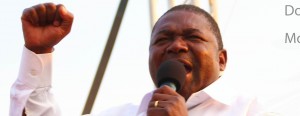Christine Lagarde was in no mood for diplomacy. At a meeting in Washington last week with President Filipe Nyusi, she made clear why the International Monetary Fund (IMF) and World Bank cut off aid.
Mozambique, she said, needed “more decisive efforts to improve transparency” along with an open enquiry on secret loans of more than $1.4bn. The IMF, which Lagarde has led since 2011, would accept nothing short of “an international and independent auditâ€.
In 2014 and already close to default, Mr Nyusi’s predecessor, Amando Guebueza borrowed from banks including Credit Suisse without telling donors, investors, the IMF or even his own parliament.
Some of the money was spent on weapons and $40m went to a new plane for the president though the loan had been sought to buy fishing vessels, and boats to patrol the coast.
In 2015, trawlers illegally netted fish and other marine life worth more than $60m from the Mozambique Channel and the new craft or “interceptors†were custom built to pursue the poachers and tow them back to port.
Under maritime law, crews fishing illegally may be jailed, while ownership of their boat is transferred to the state in whose waters they were moored.
Tough penalties that, until now, have been impossible to enforce.
Mr Nyusi has agreed to an enquiry on the loans, but his country’s debt stands at 83 per cent of GDP.
Tough times
Mozambique’s already small economy has been hit by renewed fighting between the army and guerrillas loyal to opposition leader Alfonso Dhlakama and his Renamo movement.
As a result, refugees have crossed the border into Zimbabwe and Malawi, straining relations.
In the original war that ended with a peace deal in 1995, president Robert Mugabe sent troops to help the ruling Frelimo Party but, with riots in Harare and other towns, the Zimbabwe army tied down at home.
Zimbabwe’s economic problems have also brought hardship to Mozambique. The land-locked country relies on the harbour at Beira but, with imports down to a trickle, port revenues have fallen bringing hard times to a region where Renamo enjoys support.
A new beginning?
After his meeting with the IMF, Mr Nyusi addressed business forums in Washington, Houston and New York, not so much selling Mozambique as setting out plans for a new era of openness.
“You cannot develop any country without the private sector, and my government is determined to set up a legal environment to bring this about,†he told a meeting of investors and oil barons at a resort in Houston that was once the home of President George H. Bush.
Set across 10 hectares in a wealthy part of town, the Houstonian Club and Spa has three swimming pools and a gym complex larger than some of the new hotels in Maputo.
Gas has been discovered in northern Mozambique, and Houston is home to some of the world’s largest energy firms. The dinner for Nyusi was sponsored by Exxon-Mobil.
“I plan ambitious reforms in the public and private sector,†he said and in what may have been a swipe at the largesse under Mr Guebueza, he pledged to “relaunch progress in Mozambique.â€
He said he would not waste the opportunities gained from his US visit. “These difficult times in our economy are also a time to build and we are ready to open a new page with business.â€
With yearly trade at close to a half-trillion dollars, Houston’s economy is larger than South Africa, Mozambique and Zimbabwe combined.
In Washington Mr Nyusi received a Congressional award for conservation, and he is the first president since independence in 1975 to show a passion for the environment.
“In my country you can see elephants, you can stand in the stillness of a forest and there is wilderness to explore,†he said.
Mozambique has suffered an epidemic of poaching and deforestation, but a recent study showed that its greatest risk is in the water. Of 130 ships fishing off the coast, only one had a local licence.
Back at the IMF, a team will leave for Maputo in the coming week. And a statement from Mrs Lagarde’s office said she, “welcomed the initial steps†being taken.
In southern Africa she has her hands full with South Africa’s currency and economy in downward spiral, Zimbabwe in meltdown and a drought that has devastated the region.
Despite the loans scandal, Mr Nyusi did not shy away from the “F†word. “We welcome investment in fishing,†he said, explaining that his country has a long coastline and is famous for its prawns.
He now has a coast guard fleet that can enforce the law, and if he can show the boats are being used, it may yet put a spin on a tale that his dogged his first year in office.
That the loans barely came up in talks with business is a credit to Nyusi’s charm. After a corporate lunch in Washington, he stepped from the podium and visited each of the 25 tables to shake hands with bankers, ambassadors and congressmen.
And in Houston, he addressed some of America’s toughest oil men who gave him a Stetson hat and a standing ovation.
Mrs Lagarde will be harder to please and there is clearly a way to go before Maputo is back in her good books.
Post published in: Featured


